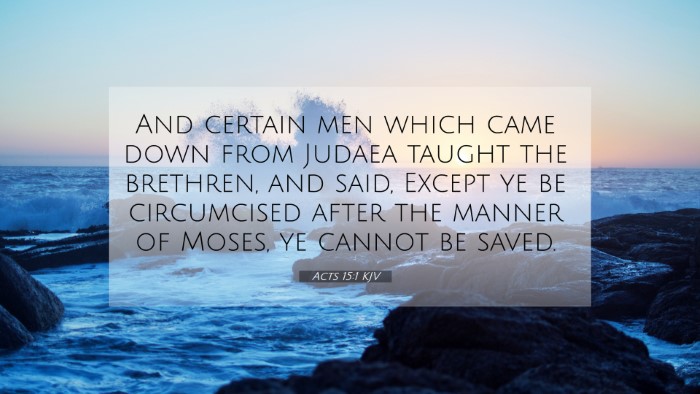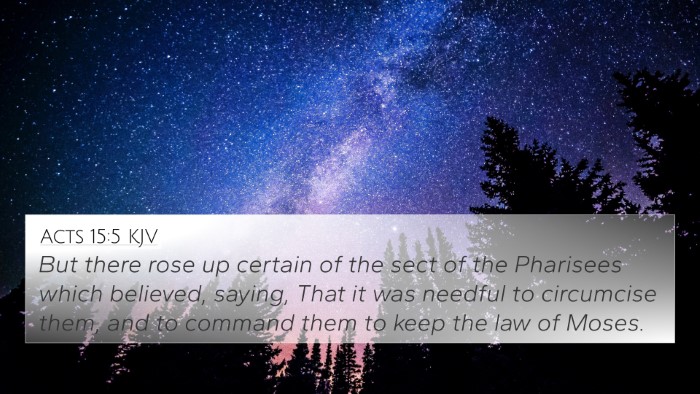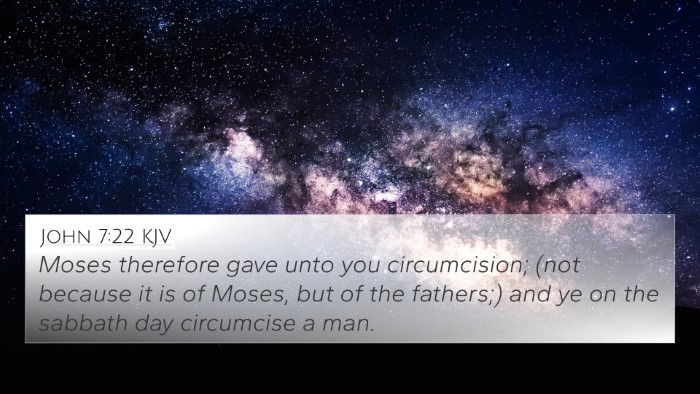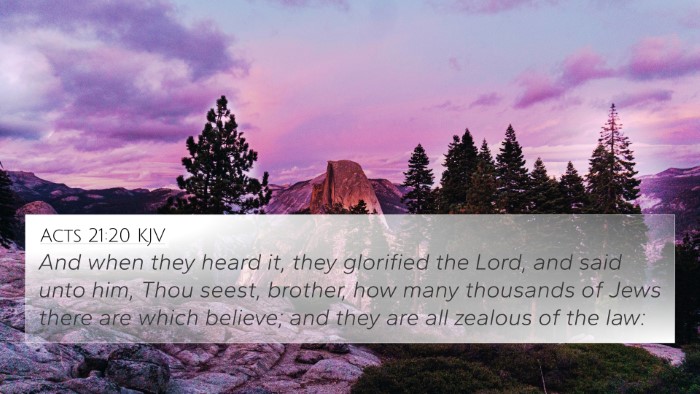Understanding Acts 15:1
Acts 15:1 is a pivotal verse in the New Testament, serving as a catalyst for a significant council concerning the early Church's governance and the nature of salvation. This verse states:
"And certain men which came down from Judaea taught the brethren, and said, Except ye be circumcised after the manner of Moses, ye cannot be saved." (Acts 15:1, KJV)
Summary of Acts 15:1 Meaning
Here, we explore the insights derived from notable public domain commentaries by Matthew Henry, Albert Barnes, and Adam Clarke.
Context and Implications
The backdrop of this verse revolves around the early Church’s struggle with the integration of Gentile believers. The men from Judea suggested that adherence to Jewish law, particularly circumcision, was essential for salvation. This notion leads to a significant theological debate.
Matthew Henry’s Commentary Insights
According to Matthew Henry, this passage reflects the confusion among believers regarding the requirements for salvation. He emphasizes that adding human efforts, such as circumcision, to God’s grace undermines the completeness of Christ’s work on the cross. Henry advocates that salvation is by faith alone, a theme that echoes throughout the New Testament.
Albert Barnes’ Commentary Insights
Albert Barnes stresses the importance of understanding the true nature of salvation. He asserts that the insistence on circumcision represents a return to the bondage of the law, contrasting with the liberty granted through faith in Christ. Barnes suggests that the dispute showcases an early sign of the Church's need to clarify its identity separate from Jewish customs.
Adam Clarke’s Commentary Insights
In his analysis, Adam Clarke points out that the circumcision controversy is indicative of a larger religious struggle. He argues that while certain Jewish traditions were meaningful, they should not be imposed on Gentile converts. Clarke emphasizes the need for unity and the rejection of divisive practices that threaten the grace-based foundation of the Christian faith.
Cross-References and Thematic Connections
Acts 15:1 offers numerous cross-references that illuminate its meaning:
- Galatians 2:3-5 - Paul’s defense against requiring circumcision for salvation.
- Acts 10:28-29 - Peter’s revelation that God accepts Gentiles without the law.
- Romans 3:28 - Justification by faith apart from the works of the law.
- Colossians 2:14 - The cancellation of the record of charges against us through Christ.
- Ephesians 2:8-9 - Salvation through grace, not by works.
- Philippians 3:2-3 - Warning against legalism and boasting in the flesh.
- Hebrews 8:6-13 - A better covenant established through Christ, superseding the old covenant.
The Role of Cross-Referencing in Biblical Study
Utilizing cross-referencing Biblical texts is essential for deepening the understanding of scripture. By identifying connections between Bible verses, one can appreciate the cohesive narrative woven throughout the canonical texts.
Tools and Methods for Bible Cross-Referencing
For those exploring how to navigate these connections, several resources can enhance study:
- Bible Concordance - A powerful tool for locating verses and cross-references.
- Bible Cross-Reference Guide - Specifically designed to link verses for comparative studies.
- Cross-Reference Bible Study - Techniques for analyzing interconnected verses to draw deeper meanings.
Identifying Themes through Cross-References
Through systematic exploration, believers can uncover thematic Bible verse connections. For instance, examining Acts 15:1 alongside Romans 3:28 provides clarity on the doctrine of justification.
Furthermore, engaging with comprehensive Bible cross-reference materials allows for a more profound engagement with the text, illuminating the fundamental truths of the Gospel.
Conclusion
Acts 15:1 stands as a crucial touchpoint for understanding the dynamics of early Christianity. It emphasizes salvation by grace through faith, challenging believers to avoid legalism. By exploring this verse with tools for Bible cross-referencing, we can discover enriching insights and connections that enhance our faith.























